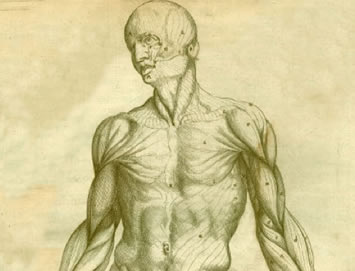Features
Health and Life Sciences
This a selection of our features that fall under the subject heading 'Health and Life Sciences'. This is to give you a flavour of the rich and diverse collections that you can find on the Archives Hub.
- Botany: botany and botanists, from nauralists to geneticists and bio-chemists.
- Cathlin du Sautoy and Hermione Blackwood: personal papers at the Royal College of Nursing Archives: Cathlin du Sautoy was deeply involved with nursing during and after the First World War, organising Red Cross units in the UK and in France. In France she met Lady Hermione Blackwood. They would become lifelong companions, settling in Hampstead with their two adopted French children after the war.
- Charles Darwin and Evolution: the 200th anniversary of the birth of geologist and naturalist Charles Darwin, and the 150th anniversary of the publication of his revolutionary book On the Origin of Species, which explained his theory of natural selection and evolution. With descriptions for the papers of Charles Darwin and fellow scientists, and also for the papers of interested philosophers and clergymen.
- Charles Darwin and the Beagle Collections in the University of Cambridge: a Voyage Round the World
- Coughs and Sneezes: influenza epidemics and public health, looking in particular at the influenza pandemic at the end of the First World War, the most serious epidemic in history; with illustrations from the Liddle Collection at Leeds University Library, and an introduction by Dr Robert Brown of the Wellcome Trust Centre for the History of Medicine at University College, London.
- Creating a COVID-19 archive at the Royal College of Nursing : Since the beginning of 2020, the Royal College of Nursing archive team have been actively collecting records relating to COVID-19 from across the organisation to build up a picture of how the pandemic has unfolded through the eyes of RCN members and staff.
- Dig for Victory!: for the National Archive Awareness Campaign, the Hub included early 20th century illustrations of wild flowers.
- The Dorset House Archive: Dorset House, the first School of Occupational Therapy in the UK, opened on New Year’s Day 1930. Dr Elizabeth Casson (1881-1954), the School’s founder, was working in a psychiatric hospital when she realised the therapeutic benefits enjoyed by patients who were presented with tasks and activities rather than mere convalescence.
- Archives of the Erskine Hospital Ltd, veterans charity, Renfrewshire, Scotland: June 2017 marked the 100th anniversary of the official opening of Erskine Hospital, Scotland. Founded as a military convalescence facility for servicemen who had lost limbs in the First World War, it has continued to care for ex-Service men and women. The University of Glasgow received an award from the Wellcome Trust to catalogue and preserve the records of Erskine.
- Forensics: a partial print of the history of forensic science, shining a light on the descriptions for the papers of physicians, pharmacists, chemists and toxicologists involved in criminal investigations, and records relating to forgery and violent crimes.
- The Great War: during the First World War, pacifists had the option of non-combat roles, such as medical orderlies, or faced imprisonment. The Society of Friends (Quakers) had already established volunteer ambulance units.
- Heritage of our medical profession: archives from the Royal Medical Colleges.
- Insects and Entomologists: enthusiasts and biologists, entomologists and zoologists.
- Meet Maria Dawson, first graduate of the University of Wales: Cardiff University Archives introduce one of their most noteworthy alumni: botanist Maria Dawson, the recipient of the University of Wales’ first awarded degree, a Bachelor of Science, in 1896.
- Ornithology: scientists, enthusiasts, and illustrators.
- Perchance to Dream: beliefs and traditions surrounding sleep, and some of the practicalities involved.
- Royal College of Paediatrics and Child Health Archives: celebrating 75 years of female members: In the 19th century, there was huge prejudice against women as doctors and many were unable to study medicine in the UK. World War I gave women the opportunity to progress in medicine but after the end of the war, they were banned from studying medicine again until the 1930s.
- Introduction to the archive collections at the Royal College of Surgeons of England : The archive contains a rich breadth of material covering not just surgery but natural history, medical science, military medicine, medical illustration, hospitals, infectious diseases and social and cultural history.
- Scottish Brewing Archive: Celebrating 20 years of preserving Scottish brewing heritage: the brewing, malting, and coopering industries - some dating back to the 18th century.
- Sea-Fever: Britain's maritime heritage, including lighthouses, plus oceanographers and marine scientists.
- Shaggy Dog Stories: writers and artists inspired by dogs.
- Stuff the diet!: baking cakes and biscuits, plus agriculture and the production of some of the ingredients.
- Think Positive: individuals and organisations who have played a part in improving quality of life, from suffragists to peace campaigners.
- Trees: trees and botany, and how they weave their way through our lives, our history, our art and architecture and our folklore.
- Tuberculosis: the epidemic disease tuberculosis, once known as 'consumption'. highlighting the records of hospitals and sanatoriums, the papers of medical professionals, campaigners and organisations, and victims of the disease; illustrated with photographs from Lothian Health Services Archive, The Women's Library, the People's History Museum, and the Royal College of Physicians and Surgeons of Glasgow.
- Unlocking the Asylum: Cataloguing the North Wales Hospital Archive: The North Wales Hospital was originally known as the North Wales Counties Lunatic Asylum, it opened in October 1848 in response to the growing concern of the treatment of the mentally ill in North Wales.
- The Welsh in Patagonia: the founding of a Welsh-speaking settlement in Patagonia in the mid-19th century.
 From: The Royal Society of Medicine (©). Tertia Musculorum tabula. Part of the Archives Hub feature on the Medical Profession.
From: The Royal Society of Medicine (©). Tertia Musculorum tabula. Part of the Archives Hub feature on the Medical Profession.

